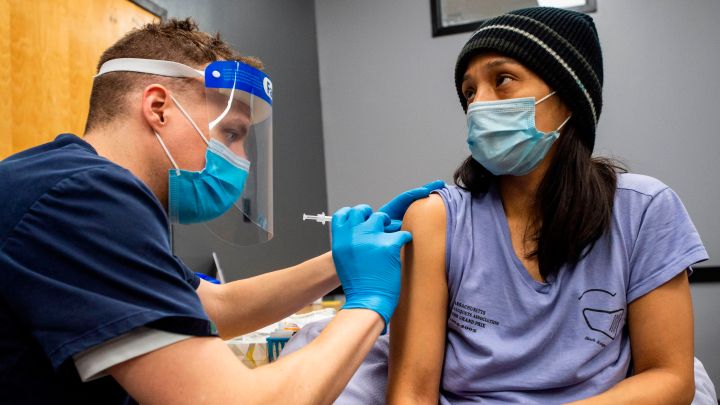
Lack of paid sick time could be a barrier to vaccination
Lack of paid sick time could be a barrier to vaccination

On Monday, all adults in the United States became eligible to receive a COVID-19 vaccine. The vaccine is free to the public, regardless of insurance. About half of all adults have received at least one dose in the U.S. and more than 200 million shots have been administered. But there are still challenges to getting more people vaccinated, like the difficulty some workers have getting paid time off to make an appointment or deal with side effects.
When Washington, D.C., software engineer Laurie Barth got the vaccine last month, she was struck with debilitating headaches, chills and brain fog.
“I don’t think I could have read text on a screen comfortably, let alone sit up in a chair,” she said.
Barth didn’t have to worry about working through the pain because she got her vaccine on a weekend and she has plenty of paid sick time she could have used.
But not all workers have access to paid time off, said Vicki Shabo, a senior fellow with New America.
“You could very easily see how it would be financially impossible and potentially job-risking for a worker to be able to get a vaccine,” she said, pointing out there is no national requirement that employers offer sick leave, much less a couple of days to get vaccinated.
And low-wage essential workers are among the least likely to have paid time off, said Elise Gould with the Economic Policy Institute. They also often have less schedule flexibility, predictability and job security than white-collar workers.
“They may not have a lot of power to negotiate for when the best time is to have the vaccine so that they make sure they don’t have to work the next day in case there’s side effects that impact them,” she said.
Before the pandemic, about 70% of the lowest-wage workers had no access to paid sick leave. The Families First Coronavirus Response Act, passed last March as the pandemic began, mandated some paid sick and family leave for employers with fewer than 500 employees. That provision expired at the end of 2020, though tax credits for employers who offer paid sick time were extended.
More than a dozen states also mandate some form of paid sick leave and many employers like McDonald’s, Starbucks and Walmart have offered some paid time off for employees to get vaccinated.
Dorit Rubinstein Reiss, a professor at University of California Hastings College of the Law, said it’s important that workers have additional vaccine time off on top of normal paid sick leave.
“We don’t want to make them choose between using limited valuable paid sick leave for other needs and using it for the vaccine,” she said.
Frontline workers, who face higher risks of contracting COVID-19, may have already needed to use paid sick time for themselves or to take care of family members.
And choosing to get vaccinated is not only a personal choice, said Arthur Caplan, professor of bioethics at New York University Langone Medical Center.
“It’s very important to acknowledge that these people are making a contribution, that they’re making the workplace safe, that they’re making it easy for customers to come in,” he said.
There’s a lot happening in the world. Through it all, Marketplace is here for you.
You rely on Marketplace to break down the world’s events and tell you how it affects you in a fact-based, approachable way. We rely on your financial support to keep making that possible.
Your donation today powers the independent journalism that you rely on. For just $5/month, you can help sustain Marketplace so we can keep reporting on the things that matter to you.












